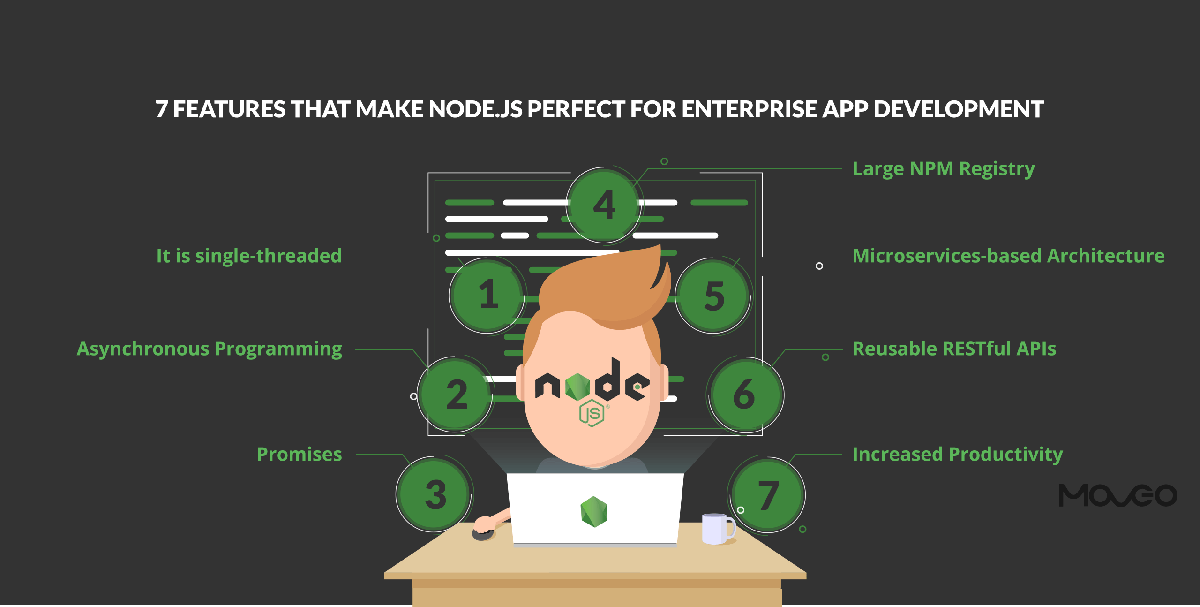Node.js, the JavaScript runtime engine developed by Ryan Dahl caught everyone’s attention right from the time of its debut in 2009. With an enviable list of pioneer adopters that includes Microsoft, Yahoo!, Netflix, Uber, LinkedIn and New York Times, Node.js is definitely a favorite of the developer community. However, the one area where some developers still harbor doubts about the efficacy of Node.js is enterprise app development.
So is Node.js a good language for enterprise app development? Enterprise apps come with their own unique set of challenges. They need to be able to track business performance, help employees stay connected, store confidential data safely, track employee performance and do a whole lot more. Clearly, enterprise app developers need a very robust language to develop an enterprise app. does Node.js fit the bill?
The truth is, yes it does. Contrary to many myths often associated with it, Node.js is actually a remarkable language for enterprise app development. Built on Chrome’s V8 JavaScript engine, Node.js packs a very large package ecosystem which is called npm. Npm gives you access to an arsenal of tools which if you know how to use well, enable you to develop the most high-end enterprise apps with ease. Over the last decade, adoption of Node.js has significantly increased, giving a boost to its very active community of developers, who have collectively added over 190,000 Node.js modules over the years.
Here are some of the Node.js qualities that make it well suited for enterprise app development:
1. It is Single-Threaded
Some might say that being single-threaded makes Node.js too slow for enterprise app development but really, that argument is but a myth. Sure Node.js is single threaded, but that is more an advantage than a disadvantage. In the case of non-event-driven frameworks, multiple parallel threads need to be created to handle multiple requests. At any given point, there are a fixed number of requests that can be handled as the number of parallel threads is but limited. In Node.js however, there is no such limit on parallel threads. As long as you have the memory and your kernel allows, you can process any number of parallel requests in Node.js without a hitch.
2. Asynchronous Programming
As an enterprise app developer, you’ve probably spent your fair share of time complaining about legacy software and monoliths, where more and more features keep adding to the main program flow making it a giant complex web impossible to maintain. With Node.js, you get the benefit of asynchronous programming which means that asynchronous events are executed independent of the main program flow, allowing it to continue processing requests.
This asynchronicity helps reduce the cost of I.O operations, and also speed them up, because one operation does not depend on another and each can be processed independently and simultaneously, improving throughput, responsiveness and latency.
3. Promises
Have you heard of Callback Hell? Of course you have, you’re a developer. Well Node.js helps you keep out of callback hell by giving you ‘Promises’ – a refreshing alternative to callbacks when dealing with asynchronous code. This is done by representing a future value that can be returned anytime after the call was made, effectively replacing the cumbersome callbacks. To understand this better, here’s how Kris Kowal of JavaScript Jabber defines promises –
A promise is an abstraction for asynchronous programming. It’s an object that proxies for the return value or the exception thrown by a function that has to do some asynchronous processing. — Kris Kowal on JSJ
You can check out his awesome article to find out everything you can do with Promises.
4. Large NPM Registry
Another great feature of Node.js is its massive NPM registry that holds, as we specified in the introduction, over 190,000 modules, and more being added every day. These are open source modules easily available on GitHub, that developers can freely use as they are, or conveniently tweak and fork them to suit their project.
This flexibility and open-sourceness encourages developer creativity and also of course, enriches their experience and increases developer satisfaction. It also facilitates code-sharing amongst team members, without giving away business logic publicly. When the developers have to worry less about boilerplates and miniature application details, they can spend more time perfecting the business logic, increasing productivity and efficiency.
5. Microservices-based Architecture
The microservice-based architecture of Node.js ensures horizontal as well as vertical scaling, with no wastage of resources. Node.js has a much lower resource footprint in terms of computing power, CPU and RAM usage, improving performance by making more tasks I/O bound instead of CPU bound. Also, microservices make it a lot easier to handle smaller teams and separate codebases, allowing you to have multiple teams handling specific services, resulting in a much faster development. Node.js also makes it easier to manage multiple cross-teams located far apart, with the bevy of tools NPM offers.
6. Reusable RESTful APIs
Another feature that has truly cemented Node.js’ position as a strong enterprise level language is its focus on reusable RESTful APIs which are the most flexible way to develop large-scale software systems. It does this with the help of APIs that can handle large volumes of data by connecting to the backend, keeping things lightweight and efficient.
7. Increased Productivity
Since Node.js applications are written in JavaScript, making it easier to learn and adapt to, and also allow developers to use the same language for the entire stack, further speeding things up. Also when the developers have access to better tools, more freedom, higher code sharing, increased creativity and a lot more flexibility, you are looking at happier, more satisfied developers who easily end up being more productive.
Wrapping Up
Honestly, a large amount of the uncertainty and doubt around Node.js being suitable or not for enterprise app development comes from a place of complacence that a lot of developers have with using Java. But when things change for the better, it is a good decision to adapt to the change. The only way to know is to dabble in it yourself a little bit before you decide if it works for you or not. Now that you have the skinny on all that Node.js has to offer to enterprise app development, go on, give it a fair try.


